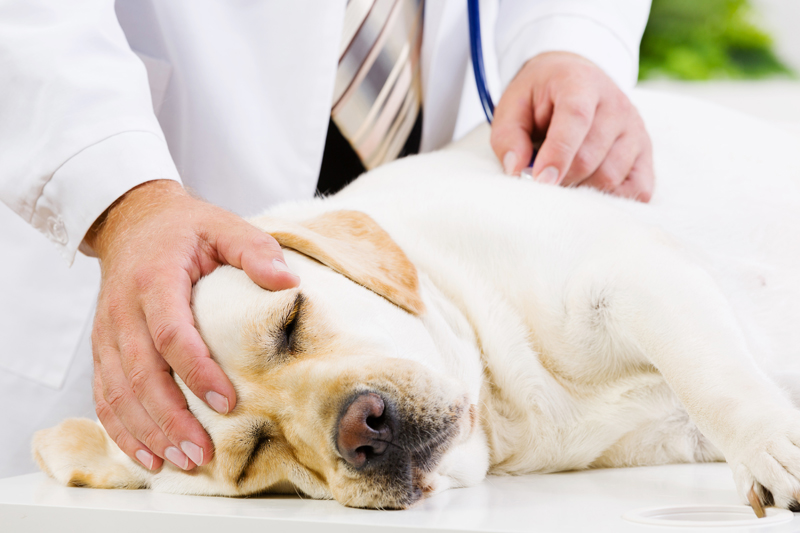Intestinal Parasites in Dogs and Cats

Dogs and cats can fall victim to many different types of parasites. Because many of these parasites live in their intestines, veterinarians will take stool samples during your pet’s annual wellness exam to check for signs of intestinal parasites. Intestinal parasites are not uncommon, especially in young animals, which is why wellness exams are so important for maintaining your pet’s good health.
Symptoms
With some parasites, you may be able to see worms in your pet’s stool, bedding, or under their tail. Puppies and kittens are especially at risk for health complications from intestinal parasites and, in serious cases, these parasites can be fatal. Another risk is caused by some parasitic infections being “zoonotic,” which means that they can be transmitted to humans. These parasites can cause serious health issues in adults and children, including scarring inflammation.
The most common signs and symptoms of intestinal parasites are:
- Diarrhea, with or without blood or mucus
- Scooting
- Vomiting
- Distended abdomen (belly)
- Weight loss
- Decreased activity
- Dull coat
Pets become infected with intestinal parasites in a number of ways, including:
- Drinking contaminated water
- Coming into contact with other infected animals
- Coming in contact with fecal material containing these parasite eggs or larvae
- Swallowing fleas that are carrying the infective stage of Tapeworms
- Nursing from an infected mother
- Predation or hunting which through ingestion transmits the parasite from a rodent or another hunted animal carrying the parasite
Types of Intestinal Parasites
Roundworm
Roundworms are one of the most common intestinal parasites found in dogs and cats. Unlike hookworms, they do not attach to the intestinal wall. Instead, they live in the intestines and consume partially digested food. Once your pet is infected, roundworms pass tiny eggs into his stool. A mother dog or cat who has had roundworms at any time in the past can transmit them to her puppies or kittens before birth. This is true even if the mother tests negative for roundworms because the larvae (immature worms) encyst in the mother’s muscle tissue and are not detected by our tests for adult worms. Another major source of roundworm infection for puppies and kittens is the mother’s milk. Roundworm larvae may be present in the mother’s mammary glands and milk throughout the nursing period. Pets may also become infected by swallowing roundworm eggs, which contain infective larvae. The larvae hatch out in your pet’s stomach and small intestine and migrate through the muscle, liver, and lungs. After several weeks, the larvae make their way back to the intestine to mature. When these worms begin to reproduce, new eggs will pass in your pet’s stool and the life cycle of the parasite is completed.
Roundworm eggs passed in another animal’s stool may be infectious to your pet. In fact, a large number of animal species have been found to harbor roundworms and represent potential sources of infection for dogs and cats, including cockroaches, earthworms, chickens, and rodents.
Hookworm
Hookworms are tiny intestinal parasites named for the hook-like mouth parts they use to attach to the intestinal wall. Pets often become infected when they swallow hookworm larvae, or immature worms, through routine grooming or ingestion of soil or other contaminated substances in the environment. The larvae may also penetrate the skin and migrate to the intestine to mature and complete the life cycle. If a pregnant dog has hookworms, the pregnancy may reactivate larvae. These larvae will enter the female’s circulation and pass to the puppies through the placental blood flow. Finally, puppies may become infected through the mother’s milk. This is a common route of infection for young dogs. Once your pet is infected, the hookworm attaches to the lining of the intestinal wall and feeds on his blood. Its eggs are ejected into the digestive tract and pass into the environment through your pet’s feces, potentially increasing exposure to other animals. In dogs, a large number of hookworms can cause anemia. This problem is most common in puppies, but it will occasionally occur in adult dogs.
Tapeworm
Tapeworms are long, flat worms that attach themselves to your pet’s intestines. A tapeworm body consists of multiple segments, each with its own reproductive organs, which are passed in your pet’s feces. Tapeworm infections are usually diagnosed by finding these segments—which often resemble white grains of rice or seeds—in your pet’s stool, on his rear, or where he lives and sleeps. In order to become infected with tapeworms, your pet must ingest a flea that contains tapeworm eggs. This process begins when fleas are accidentally ingested upon licking or chewing the skin. The flea is digested within your pet’s intestine and the tapeworm hatches, anchoring itself to the intestinal lining. It is important to note that any exposure to fleas may result in a new infection that can occur in as little as two weeks.
Whipworms
Whipworms are parasites that live in the cecum (where the small and large intestine meet) and colon, where they cause severe irritation to the lining of those organs that can result in watery, bloody diarrhea and weight loss. Whipworms can be one of the most harmful worms found in pets if not properly treated. Whipworms pass microscopic eggs in the stool. Pets become infected by ingesting these eggs in soil or other contaminated substances in the environment. Whipworm eggs are very resistant to drying and heat, allowing them to remain viable in your pet’s environment for years. Once laid, the eggs mature to an infective stage and reinfect within 10 to 60 days. When the eggs are swallowed, they return to the lower intestinal tract to complete the life cycle.
Coccidia
Coccidia is a single-celled organism that can infect cats and dogs through contact with fecal matter containing the parasite. A pet can become infected by eating contaminated soil, drinking contaminated water, or licking paws and fur that has come into contact with infected feces.
After infection, coccidia travels to the intestines and destroys the intestinal lining, which prevents absorption of nutrients. This causes severe diarrhea and dehydration. In some cases, infection can even lead to death. Coccidia is very contagious to puppies and kittens, so frequently cleaning up feces and frequent changes of water to prevent contamination is especially important around young pets.
Giardia
Giardia is another single-celled intestinal parasite that can infect dogs, cats, and humans. Infection is caused by ingesting giardia through contact with contaminated food, water, soil, or fur. Like coccidia, giardia travels to the intestines and damages the lining of the intestinal wall, reducing the absorption of nutrients. Unlike coccidia, infections often have no symptoms. If there is diarrhea, there is usually no blood in the stool. Diagnosing giardia can sometimes be difficult due to the lack of symptoms and multiple stool samples are needed to confirm the infection because of the specialized tests of giardia.
Diagnosis and Treatment
Your veterinarian will take a stool sample to test for the presence of microscopic eggs laid by adult worms. The veterinarian will then mix the sample with a solution that makes the eggs more visible underneath the microscope. In some cases, a routine stool sample test may be insufficient to diagnose a parasite. For example, detecting the single-celled parasite giardia requires a special solution to be added to the sample. In another case, testing for tapeworm eggs can sometimes cause false negatives. And if the intestinal worms infecting a dog or cat are not mature enough to be producing eggs, the fecal sample test will give negative results–which is why multiple fecal tests over a period of time are sometimes needed to successfully diagnose infection by an intestinal parasite.
After a diagnosis has been made, intestinal worms can be treated by using a dewormer solution. Other types of parasites require different types of medications to treat. There are some over-the-counter treatments for intestinal worms, but these don’t work very well. Veterinarians have the most powerful and effective dewormers available for treating your pet and have guidelines that they follow to try to identify and protect our pets and their people. The recommendation is to deworm puppies and kittens automatically, deworm animals intended for breeding programs, and checking a sample of feces (again, a stool sample) at least twice yearly.
Prevention
Preventing infection by intestinal parasites is highly dependent on good sanitation practices.
- Clean up your pet’s droppings as quickly as possible to prevent the spread of infection.
- Make sure your pet has a source of fresh, clean water, because these parasites can often be found in contaminated water.
- Prevent your pet from eating soil or grass, which can contain parasitic eggs.
- Remember that droppings from other dogs might be infested–be sure that your dog doesn’t interact with these while out on walks.
- Use a monthly heartworm preventative medicine for your pet.
- Use a monthly flea prevention treatment to prevent parasite transmission to your pets from infected fleas.
- Don’t allow yourself or your family to become infected–wash your hands after playing with your pet and make sure that outdoor play areas for your children, like sandboxes, do not contain any animal droppings.
The good news is that intestinal parasites are easy to treat and even easier to prevent. In fact, if you give your dog a heartworm prevention medication, you’re most likely protecting your pet from the most common intestinal parasites. Several heartworm medications can treat roundworms and hookworms, and some products can even treat whipworms, tapeworms and one or more stages of fleas. You’ll want to talk with your veterinarian to determine which parasite control medication is right for your pets.
Share This Post
Recent Posts
About Shallowford Animal Hospital
Shallowford Animal Hospital and The Pet Spa at Shallowford are dedicated to the exceptional, compassionate care your pet deserves. Pets hold a very special place in our families, and we treat yours like our own.



